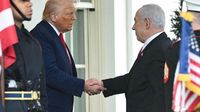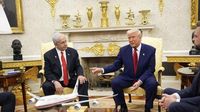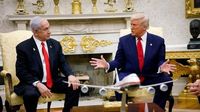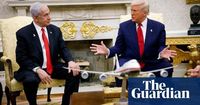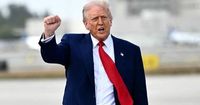On April 7, 2025, President Donald Trump announced that the United States has begun direct negotiations with Iran regarding its nuclear program. This significant development comes after months of heightened tensions and diplomatic standoffs between the two nations. Trump, speaking alongside Israeli Prime Minister Benjamin Netanyahu at the White House, revealed that a "very big meeting" is scheduled for Saturday, April 12, 2025, to discuss the potential for a new nuclear deal.
During the announcement, Trump emphasized the urgency of the situation, stating, "Iran cannot have a nuclear weapon, and if the talks aren’t successful, I think Iran is going to be in great danger." His comments reflect a longstanding U.S. policy aimed at curbing Iran's nuclear ambitions, which have been a focal point of international concern for years.
In a preceding letter to Iran’s Supreme Leader Ayatollah Ali Khamenei, Trump expressed a willingness to negotiate, a move that Iran initially rebuffed. However, Iranian Foreign Minister Abbas Araghchi confirmed that the upcoming discussions would take place in Oman and described them as "as much an opportunity as it is a test." This statement indicates a cautious approach from Iran, which has maintained that its nuclear activities are strictly for civilian purposes.
The backdrop of these negotiations is complex. In 2018, Trump withdrew the U.S. from the Joint Comprehensive Plan of Action (JCPOA), an agreement that had imposed limits on Iran's nuclear activities in exchange for sanctions relief. Since then, Iran has gradually breached the terms of the agreement, leading to increased tensions and fears of military confrontation. In recent months, Trump has repeatedly hinted at the possibility of military action if diplomatic efforts fail, stating, "If they [Iran] don’t make a deal, there will be bombing, the likes of which they have never seen before."
Netanyahu, who has long advocated for a hardline stance against Iran, expressed skepticism about the talks, suggesting that military action might still be necessary. He has previously stated, "We and the United States are both united in the goal that Iran does not ever get nuclear weapons." His comments underscore the delicate balance of interests in the region, where Israel views Iran as a significant threat.
As discussions loom, the international community watches closely. The potential for a renewed agreement could reshape the geopolitical landscape in the Middle East. However, many analysts caution that the path to a deal is fraught with challenges. Marwan Bishara, a senior political analyst at Al Jazeera, noted that while Trump is eager for a deal, Netanyahu's preference leans toward military solutions, complicating the diplomatic efforts.
Further complicating the situation is the ongoing conflict in Gaza, where Netanyahu has been criticized for his military actions against Hamas. Trump hinted at a potential resolution to the conflict, stating, "I’d like to see the war stop, and I think the war will stop at some point that won’t be in the too-distant future." However, he did not provide specifics regarding a ceasefire or peace plan.
Additionally, Trump indicated a desire to mediate tensions between Israel and Turkey, remarking on his good relationship with Turkish President Recep Tayyip Erdogan. Trump stated, "Any problem that you have with Turkey, I think we can solve, as long as you are reasonable." This assertion reflects his broader strategy of positioning the U.S. as a facilitator of peace in a region marked by conflict.
As the April 12 meeting approaches, both sides remain cautious. Trump’s administration has ramped up military activity in the Middle East, particularly against Iran-backed groups in Yemen, which adds another layer of complexity to the already tense situation. Reports indicate that U.S. military operations have cost nearly $1 billion in just weeks, raising concerns about the long-term implications of such engagements.
In light of these developments, the upcoming talks represent a pivotal moment in U.S.-Iran relations. The outcome could either pave the way for a new diplomatic framework or escalate tensions further, depending on the willingness of both sides to compromise. With Trump advocating for a deal and Iran expressing cautious openness to dialogue, the stakes could not be higher.
As the world awaits the results of the negotiations, the potential for peace hangs in the balance, with both nations at a crossroads. The coming days will reveal whether diplomacy can prevail over decades of animosity and suspicion.
